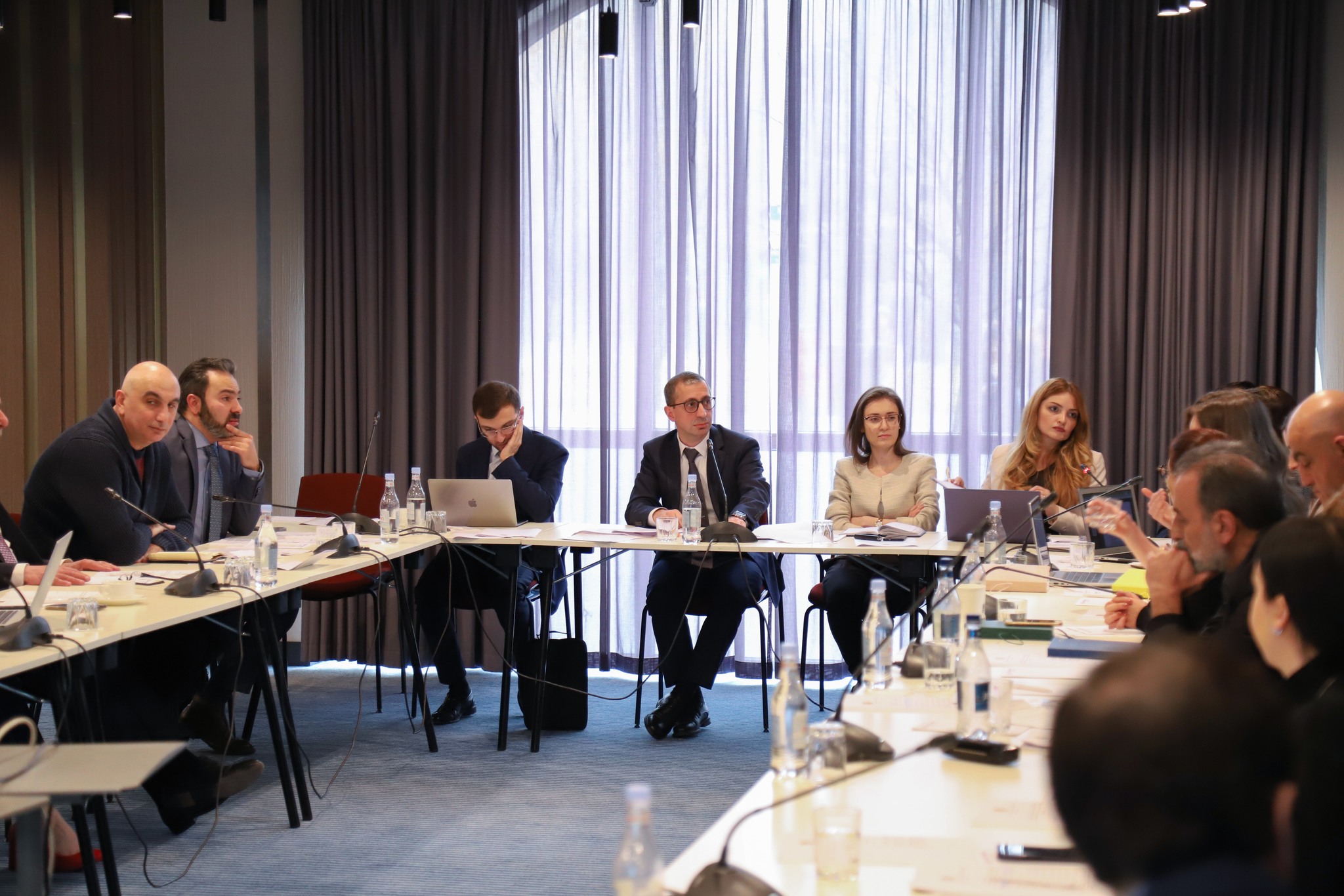On 3 March, the 1st meeting of the working group for the development of the fifth Anti-Corruption Strategy and its Implementation Action Plan, created by the order of the Minister of Justice of the Republic of Armenia, took place. The working group for the development of the Anti-Corruption Strategy and its Implementation Action Plan was created and its individual composition was approved by the order of the RA Minister of Justice No. 75-A of 14 February, 2022, which was amended by the order of the Minister of Justice No. 104-A of 28 February, in new edition confirming the individual composition of the working group. Mr. Karen Karapetyan, Deputy Minister of Justice, Head of the Working Group chaired the meeting.
At the beginning of the session, member of the working group Mr. Karen Zadoyan, President of the Armenian Lawyers’ Association, raised the issue of developing the New Anti-Corruption Strategy of the RA based on the Kuala Lumpur Statement on Anti-Corruption Strategies, which emphasizes that process of developing anti-corruption strategies, the design and content of anti-corruption strategies and the monitoring and evaluation of anti-corruption strategies should be carried out based on the established international popular principles. Referring to the process of developing the Anti-corruption Strategy, Karen Zadoyan based on only one example from the Kuala Lumpur statement regarding the elaboration of the Strategy, “Stakeholder Involvement (Inclusive Process) and Ownership”. He argued that the working group cannot be considered inclusive, because the CSO Anti-Corruption Coalition of Armenia, the only and leading network in the Anti-Corruption field, is not included in the group. And thus, failing to fulfill the instruction given by Nikol Pashinyan to the Minister of Justice of the Republic of Armenia during the first session of the Anti-Corruption Policy Council complemented staff, held in Jermuk under the chairmanship of the Prime Minister of the Republic of Armenia on 11 February of this year, regarding the creation of a working group for the development of a New Anti-Corruption Strategy of the Republic of Armenia based on the inclusive principles.
Tigran Yegoryan, member of the working group, lawyer of the “Europe in Law” Human Rights NGO, proposed to start the development of the Anti-Corruption Strategy and its Implementation Action Plan after the analysis of the report and other comparable information to be submitted by all actors responsible for the implementation of the strategy on the work done under the previous strategy and the issues raised. And in this regard he referred to another principle of the Kuala Lumpur Declaration on the development process, the “Sound Knowledge Base“, according to which the development, implementation and monitoring of strategies should be informed by sound diagnostics, needs and evidence of risk and vulnerability areas and gaps in anti-corruption policies and institutions.
As a result of the discussions, the working group, decided to start the development of the Anti-Corruption Strategy and its Implementation Action Plan within seven days by gathering all the available reports and other comparable information regarding the work done by the previous strategy and the problems raised by all the actors responsible for the implementation of the strategy, including the sectoral non-governmental organizations. After which, following confirming the content structure of the strategy, start the development of the actual content, estimating that the final draft of the strategy will be ready by 1 July of this year.
During the discussions of the working group, four strategic content areas were presented: prevention of corruption, prevention of corruption in the business sector, anti-corruption education and public awareness, curbing-corruption and the vision of the working subgroups in these areas. After which Karen Zadoyan raised the issue that it is a methodological mistake to present the prevention of corruption in a separate direction outside of the prevention of corruption in the business sector, as it should be considered exclusively under the prevention of corruption in conjunction with the prevention of corruption in the public sector. He proposed to define strategic directions following the classical model defined for similar strategic directions: anti-corruption education, prevention of corruption and ensuring the inevitability of punishment (curbing-corruption). The working group considered this acceptable.
Karen Zadoyan also proposed to the working group to set the term of the new strategy for 10 years, and as a result of discussions, the working group found it appropriate to consider the duration of the strategy up to 10 years.
Notably, in 2022, the Armenian Lawyers’ Association published the Alternative Public Monitoring Report on the Implementation of the RA Anti-Corruption Strategy and its Implementation Action Plan for 2019-2022, which included proposals for inclusion in the framework of the new strategy.
It should also be noted that thiss working group for the development of a new strategy was created based on the proposal of the President of ALA during the meeting of the Anti-Corruption Policy Council held in Jermuk.















